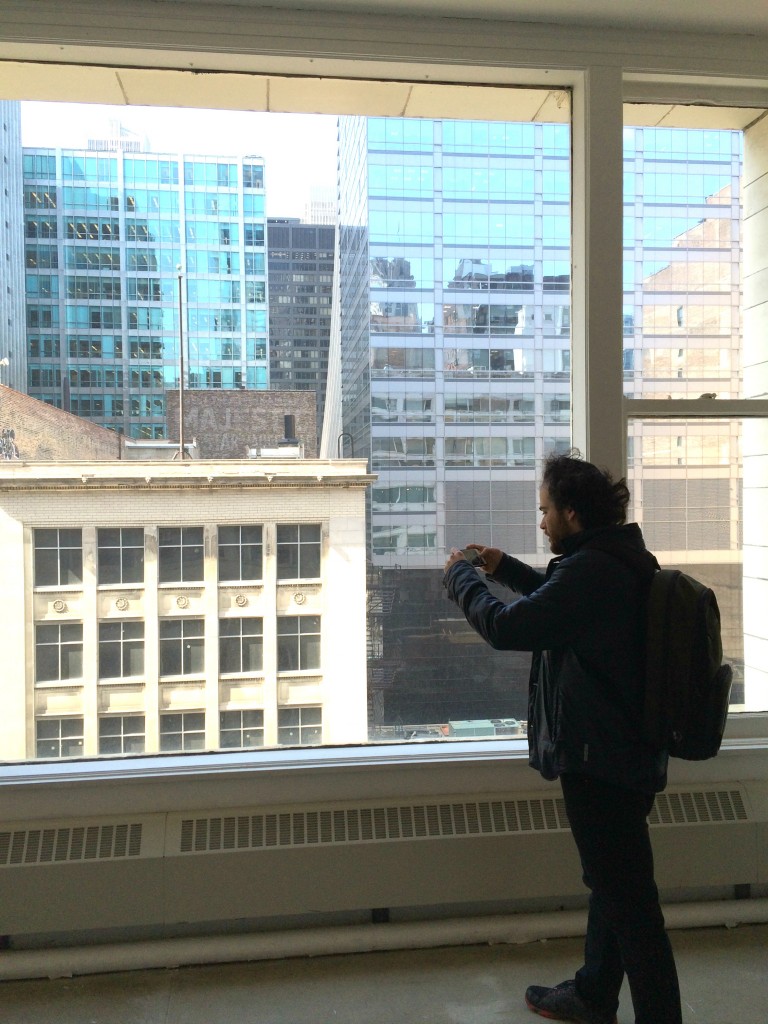The MFA Show Directive:
A silent room that is cacophonous,
perfectly still in its ceaseless motion
holding everyone and nothing
and feeling melancholy in its joy.
At some point throughout the semester, I think that everyone involved with the MFA show feels as if we are attempting to create the impossible space described above. The show is the culmination of our time here, and its sheer volume and presence demands a certain amount of attention. Primarily, you must produce work to be in the show. As artists you are also working with us, the graduate curatorial assistants (GCAs), and the nature of our work requires your attending to as well: emails, studio visits, meetings, etc. There are more than 100 artists in the show this year, so the challenge of the GCA is to navigate the attention required for collective decision-making (how do we make a show that feels cohesive and interesting) and individual needs (how do we make this work for you). Beyond the MFA show, we all face other very real demands on our time. Spring is on its way, promising opportunities to emerge from Chicago hibernation, other coursework, work outside of school, personal relationships and the planning and consideration of what our lives will be after school ends. All of these things demand energy. Where then, do we find resolution in this impossible task when overwhelm and exhaustion are not sustainable solutions? What does it mean to attend to something? Is it only to give it the necessary space in our minds and schedules? Or is there more to giving something adequate attention? For me, there are two additional elements to giving something attention – beyond just scheduling time to work on it – they are devotion and discipline. Devotion, with roots in the latin vovere, or to vow. And discipline, not to say training or following rules, in the way we know it, but discipline in the form of consistency and a quest to learn. This orientation places me in a space of intention and reverence to what I hope to accomplish, and somehow the energy and time spent feels different to me. It’s less tortured, I’m pulled from within to the task. As a GCA for the MFA show, the decision to work on this project, became, essentially, a vow to learn about you and your work. It is only once that is done do things like floorplanning become valuable endeavors. In my research and life, I advocate for administrative and managerial work that is tightly bound to the artistic processes of the artists involved. I hold this as a primary value and I intend to build every administrative task into one that refers to and is in relationship with studio practice. Nothing is done for the sake of it; it must move the work forward. At times, this is impossible.
A Poetic of Attention and Failure:
It is from this space that I propose viewing the MFA show as an experiment in attention and failure. I propose this because I have found that the attempt at the impossible a very valuable method of working. To attempt something that cannot be done, to attend to it in the way I describe above, holds an inherent hopefulness. To attempt requires the belief that something will happen. Maybe we will achieve or even partially achieve that thing that can’t be done, maybe we will discover something else entirely. In attempting we uncover what is possible. What can happen reveals itself to us. To use what seems impossible, or likely to fail, as an organizing function. Impossibility as a creative constraint. How can one show a work in the gallery if it never enters the space? How can we create a feeling of interiority – an internal space of quiet and reflection – within a big open space? It is here that I will place my attention, that is to say, my devotion and discipline, to uncover a negotiated reality with the impossible. In this – the attempt – the process aims to attend in a manner wholly different than one situated in difference and conflict. It is my hope that a poetic of failure rooted in thoughtful attention may be able to alter the context in which we engage with the process of collectively making the MFA show and create infinite iterations in response to infinite impossibilities.
One of my favorite writers about performance and live arts, Sara Jane Bailes, has said that in attempting the impossible “it is not simply what is represented that will alter, but the way in which representation is conceived of that changes, and here lies the radicality..” The way we make the MFA show – part learning process, part experiment – can change the way the show is conceived of and in doing so builds a collective attempt at the impossible. A manifestation of our individual and collective hopes. We will fail, and it will be perfect.



